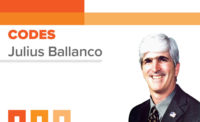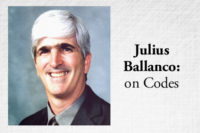ASPE convention, code activities make for a busy fall.

At the end of October, the American Society of Plumbing Engineers will hold its biennial convention in Charlotte. If you haven’t signed up to attend, do so right away. Anyone involved in plumbing engineering needs to attend the ASPE convention.
Held every two years, this is the premier plumbing engineering show. In addition to the show, you can attend 16 3/4 hours worth of continuing education. For my fellow P.E.s, that is more than is required on an annual basis for continuing education to maintain your license. What a deal, a great show and a year’s worth of education.
The show is free. To attend the continuing education session, you do need to be fully registered for the convention. ASPE lowered the cost to attend to $695 per member. That is a steal considering you also receive a number of meals with that fee.
ASPE has posted the education programs and registration information and directions on its website at www.aspe.org.
I would be remiss if I didn’t put in a plug for the presentation from the ASPE Research Foundation regarding its latest research on storm drainage design specifically relating to roof drains. As president of the Research Foundation I will be making the presentation, but that’s not why I am promoting it.
I was blown away with the test results. This session is one not to miss. Simply stated, you will be changing the way you design storm drainage systems. The report concludes that the sizing method used for the last 80 years has been incorrect.
If you attend, you will receive a copy of the Research Report on Roof Drainage. In Word format, the report is approximately 190 pages in length. By the time it is typeset, the report will be reduced in page length, but still will be quite substantial
All sorts of codes news
The month of September is a key date for code activities with all plumbing model codes. The deadline for submitting changes to the National Standard Plumbing Code, published by Plumbing-Heating-Cooling Contractors - National Association, is Sept. 27. You should have your changes in by now if you would like to modify the National Standard Plumbing Code.
PHCC doesn’t make it easy to submit a code change. You have to be in the know, otherwise you will have a difficult time finding the code change form. The fastest way to find the code change form is to visit www.phccweb.org, type in “NSPC Code Change Form” and download the form.
If you miss the deadline, the next date to keep in mind is November 2013. That will start the second cycle for the 2015 edition.
Since New Jersey is the only state that adopts the National Standard Plumbing Code as the mandatory statewide plumbing code, the hearings for the next three years are scheduled to be held in the Garden State. It only makes sense to bring the hearings to the state using the code.
September also marks the start of the IAPMO code change cycle for the 2015 codes. IAPMO has posted a call for code changes. The deadline for submitting changes is Jan. 3, 2013. Any changes to the 2015 Uniform Plumbing or Mechanical Code must be submitted by this deadline.
The first hearing on these changes will take place the week of April 29, 2013, in Salt Lake City. This is the meeting where the Plumbing Technical Committee and Mechanical Technical Committee conduct their first reviews of the code changes.
IAPMO has been holding preliminary meetings of its Task Group in preparation for the next cycle. One of the recommendations that will be issued is the method of referencing standards in the Uniform Plumbing Code. If approved, the standard will have to be located within the code text in order to be listed in Chapter 14, which is the list of all standards in the code. This method of referencing standards is currently used in other codes. Such a change will be beneficial to the engineering community, helping to identify the appropriate standard for various plumbing products.
September, being a busy month, also is when ICC publishes the public comments to the code changes in Group 1. This includes proposed changes to the Plumbing and Mechanical Code. The public comments can be downloaded from the ICC website at www.iccsafe.org.
The public comments set the agenda for the hearings at the annual ICC meeting in Portland, Ore., the week of Oct. 22. ICC promised to make sure the plumbing hearings do not conflict with the ASPE convention in Charlotte. There will be many plumbing professionals shuttling between Portland and Charlotte since the two meetings bump up against one another.
Even if you are not going to attend the ICC code hearings, I would encourage you to download the public comments. These comments provide the supporting documentation regarding proposed changes. They are a great source of information to help you understand any change that may be approved. Sometimes the code language is completely understandable. The substantiating statement can often help to explain what is required by the code text.
The ICC hearing in Portland is the final session for developing the 2015 International Plumbing, Mechanical and Fuel Gas Codes. The next code change cycle will not start until 2015. The new codes are scheduled to be published sometime in 2013, probably closer to the end of the year.
In next month’s column, I will review the major changes that receive public comments to the ICC codes. I hope to see some of you in Portland at the ICC code hearings. If not Portland, I hope to see all of you in Charlotte at the ASPE convention. Be sure to say hello, and enjoy the ASPE show.


